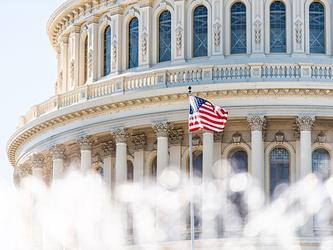‘Uncertainties increase demand for insights’: Melanie Courtright on the outlook for US research

The US is the world’s biggest market for insight, a superpower both economically and within market research. The US research market in 2023 was worth around $77bn, according to professional body The Insights Association, a 7.6% rise on the previous year. In comparison, the UK – the second largest insight market worldwide – is valued at £9bn a year, according to the 2025 Research Live Industry Report.
“The industry is expected to continue to grow, though not at the same pace as immediately post-Covid, and not evenly across all eight sectors of the profession,” says Melanie Courtright, chief executive at The Insights Association, discussing the US insights sector. “Growth will be seen by the companies that can capitalise on the inflection points of societal, technological, quality and economic pressures, while those that don’t navigate that change well will struggle.”
Courtright has led The Insights Association since 2019, prior to which she worked at Dynata and Research Now. She says that there are lessons for other markets, including the UK, in which types of research businesses are performing well in the current economy.
“Companies that are growing are cutting through the noise of a very crowded industry, and are innovating, specialising and transforming, all while keeping their sales and services mechanics focused and successful,” she says. “They aren’t getting distracted or chasing too many things at once. They are strategically focused on creating new and increased value for their customers.”
New costs
Tariffs – duties imposed in imports by governments – have hogged headlines in recent weeks, with their reintroduction to the US by Donald Trump earlier this year causing significant turbulence in world financial markets. Most countries in the world, with a few notable examples including China, have seen a baseline 10% tariff added to all exports to the US.
“Tariffs can introduce economic uncertainties that affect various industries, potentially altering market dynamics and consumer behaviours,” says Courtright. “For the market research industry, this presents both challenges and opportunities.
“On one hand, tariffs can disrupt supply chains and economic stability, leading to cautious business spending. On the other hand, such uncertainties increase the demand for market insights as companies seek to navigate the changing landscape, thereby creating opportunities for market researchers to provide valuable guidance.”
The imposition of tariffs has come at a time of falling consumer confidence in the US. The University of Michigan’s consumer sentiment survey showed consumer confidence to be at a score of 50.8 in April 2025, the lowest level since June 2022 and a significant fall from 57 in March, well below forecasts of 54.5.
“The US market, and even the world, are in a heightened time of Vuca: volatility, uncertainty, complexity and ambiguity,” says Courtright. “During these times, consumer confidence declines because people are so uncertain about the future, and what it means for them personally, professionally, economically, and even psychologically and philosophically.
“As insights professionals, while we navigate these times in our personal lives, we have an even greater responsibility professionally to help drive understanding and decision-making. That means increased insights, navigating shifts in priorities, focusing on innovative and agile methods, elevating our role strategically, delivering deeper understanding and managing business pressures. All while staying focused on our primary calling: to represent people and deliver their needs to the world.”
How might the US market research industry be impacted by falling consumer confidence and tariffs? “It’s simply too soon to know what, if any, long-term impacts the tariffs will have. The globe is collectively holding our breath to see where all of this is going, and it’s certainly fuelling the decline in confidence.
“That said, the insights profession should play a key role in scenario planning around potential outcomes of changes in the economy, and how companies may need to adapt pricing, supply, attitudinal, or regulatory changes, with those potential decisions all grounded in current research.”
She adds: “Importantly, economic worries plague consumers, impacting their spending behaviours, and companies, as they work to predict the company performance.”
Navigating barriers
Courtright identifies several barriers to growth in the US research industry. “Increasing competition from economic pressures as well as a mature market is forcing insights firms to lower prices while maintaining quality, which squeezes profit margins,” she says. “Fluctuating client budgets, changes in the types of data and services buyers want and project-based revenue models make it difficult to forecast income accurately.”
Other challenges include client-side restructuring leading to relationship disruptions and project delays. Like in many places, insights businesses are grappling with staffing and remote working, government and legislative pressures, demographic shifts, the rise of AI, infrastructure and scaling issues.
Courtright also points to the key challenges of ensuring data quality, navigating privacy concerns and managing the integration of new technologies. In 2023, The Insights Association joined other industry bodies, including MRS, in establishing the Global Data Quality Initiative (GDQ) as a coordinated effort to address ongoing and emerging risks to data quality across market and social research, consumer insights and analytics. In March, a Data Quality Excellence Pledge was formed to set out quality standards for the industry.
Courtright says that concerns over data quality “erode people’s confidence in the insights generated, even pushing some to switch to other means of insights generation perhaps even before they are fully proven”, with the US industry’s use of diverse data sources amplifying the challenge. “Implementing rigorous data validation and cleansing processes is essential to maintain high-quality standards,” Courtright adds.
AI presents both opportunities and data quality challenges for the US insight landscape, from increased efficiency in data analysis to concerns over the knock-on effects on the quality of third-party panels and the issues with identifying AI-generated responses in surveys. “For AI to fully deliver on its promise, the data that it uses must be high quality, so regardless of how we use the data, we must address quality concerns,” Courtright adds.
Then there are challenges from an increasingly fragmented legal system, with many US states having different interpretations of key areas of the legislative agenda. The federal system provides states with the power to impose their own laws in several different areas, such as data privacy. “Changes in the presence of legislation in areas of like labour and tax laws, plus the lack of federal privacy legislation, is creating an environment where companies must navigate 50 sets of laws within the US, and understand the constant flow of changes,” Courtright adds.
However, the tightening of privacy laws in states including California could have a positive side-effect for researchers. “The exponential growth in data generated from digital channels, devices, proprietary data and social media presents immense opportunities for insights professionals,” Courtright says. “With increasing data privacy regulations, first-party data has become more valuable for brands seeking compliant insights.”
There remain plenty of opportunities for insights suppliers in the current climate, according to Courtright. “Budget cuts and downsizing have left many client organisations with limited in-house analytics capabilities, increasing reliance on external insights providers,” she says. “More firms are investing in specialised insights services for sectors like healthcare, fintech and e-commerce, driving demand for tailored analytics solutions.”
Reaching out
Courtright thinks there are lessons the US can learn from other markets, in particular on developing a stronger culture of certifications, audits and transparency in market research. This includes adopting “quality signals” for market research buyers through more emphasis during the procurement process on issues including association membership, ISO certification and quality metrics, and process transparency. “Other countries have a much stronger culture of requiring an agreed upon base quality framework that is auditable, and the US is working towards a similar goal,” Courtright adds.
Overall, Courtright is optimistic about the future of the US market research sector. “There will always be a need for insights, especially with the pace at which the world is changing. And while the way we produce those insights may change, the science of studying human needs and values to improve the services offered will remain.
“The challenge will be for existing firms and professionals to reinvent themselves and stay relevant, so as not to be replaced. Insights companies and professionals won’t be replaced by new technology, but they will be replaced by people who use the new technology to improve their services, if they don’t evolve.
“The continuous evolution of technology, coupled with an increasing emphasis on data-driven decision-making, positions the industry for growth. By proactively addressing challenges and embracing emerging opportunities, the industry can continue to provide valuable insights that drive business success.”

We hope you enjoyed this article.
Research Live is published by MRS.
The Market Research Society (MRS) exists to promote and protect the research sector, showcasing how research delivers impact for businesses and government.
Members of MRS enjoy many benefits including tailoured policy guidance, discounts on training and conferences, and access to member-only content.
For example, there's an archive of winning case studies from over a decade of MRS Awards.
Find out more about the benefits of joining MRS here.














0 Comments